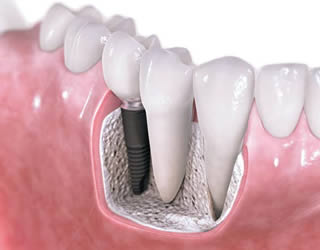Dentures Or Implants To Replace Missing Teeth?

Choosing the most appropriate option to replace a missing tooth can be a difficult decision. Our Wickford dentists offer their thoughts.
While most people hope never to need anything more than a dental filling, if even that, the reality is that some of us will need more extensive treatment to preserve a tooth at some point in our life. This can help to prolong the useful life of a tooth, sometimes for a very long time. On occasions though, even preserving a tooth might not be possible and it may need to be extracted.
Not all tooth loss occurs like this of course, and some people will lose a tooth through a fall, collision or even a sporting accident. However tooth loss does occur though, it leaves the patient with a decision to make; how best to replace the missing tooth.
Not replacing a lost tooth is a poor choice for a number of reasons which we will discuss in a future blog. For the sake of this blog though, let us presume that the tooth that has been lost is a front and highly visible tooth that almost everyone would want to replace. Today we are going to take a look at the two main options available at the Cygnet Dental Practice; dentures, or a dental implant.
Pros and cons of dentures
Dentures have been around for a very long time and are a tried and tested solution to replace a missing tooth or a number of teeth. With advances in modern dentistry, including dentures that are flexible with the movement of the mouth, there is little doubt that they offer a better and more comfortable solution than may have been the case in the past. The focus on dental aesthetics has also meant that they now provide a much more natural looking solution than they once used to.
Another advantage of dentures is that, for the more nervous patient, having them usually requires no invasive treatment at all. They are also one of the more affordable solutions available.
The benefits of dentures do come with some potential drawbacks though. As the face changes shape a little following tooth loss due to reabsorption of the bone in that area, this can cause the dentures not to fit as well as before. This can lead to some soreness from the friction between denture and gums and may also cause them to become less stable. This latter factor can cause problems with eating certain foods and even, potentially, with some speech issues. In more extreme cases, the denture can be so loose that it causes visible movement in the mouth, possibly even causing it to fall out. This can certainly be embarrassing if you are speaking to someone when this happens.
Finally, dentures need to be kept clean and this can be a messy and fiddly process as it involves removing them from the mouth to do so. They also need to be soaked overnight as well.
Pros and cons of dental implants
Dental implants are also now well established although for less time than dentures. Although very rudimentary versions have been found in archeological digs, it is largely thought though, that many of these were placed post mortem to improve the appearance of the person in the ‘afterlife’.
Modern dental implants were first used in dentistry in the 1960s but have become much more widespread since around the 1980s and are now a popular first choice for many people. They are a great option and although more expensive than dentures, they do provide a much better experience and may even work out more affordable over time as they rarely require the repairs and replacements that dentures sometimes do.
Placing one of our high quality dental implants is a more complex procedure than providing a patient with dentures. X-rays and scans need to be taken to position them exactly and an invasive treatment is required to do so. The patient will often have to be careful with aftercare, including what they eat, for around three months as the bone has to bond with the newly placed implant. It is this that provides them with their superb strength and stability.
That is pretty much where the ‘cons’ of dental implants end though. Once this one off procedure has taken place and the implant fuses with the bone, the patient is left with a very strong and secure replacement tooth that can last them for twenty years or more providing that they look after it well. Even this is more straightforward than with dentures. You simply brush and floss around them as you would do your natural teeth. Regular hygienist visits are important in order to avoid peri-implantitis, one of the few threats to them. This is very rare though if you look after your teeth and most implant failures are due to poor aftercare on the patient’s part. We will provide you with full aftercare advice so that this can be avoided. As you will see, the simple steps that need to be taken are no more than you should be doing with your natural teeth anyway.
While you might avoid certain foods while wearing dentures, once the ‘healing period’ for your new implant has passed, you will be able to eat what you want with the full confidence that they will remain firmly fixed in the jaw and will not move around.
While teeth implants do cost more than dentures, we feel that they offer good value for money and also are able to provide our Wickford patients with a range of payment plans to help you to spread the cost of the treatment over a period of time.
How to make the right decision?
We appreciate that this can be a difficult decision for some people. Some are deterred by price while others might be concerned about the treatment itself. All we ask is that you try to keep an open mind when you discuss this with the dentist. We are always happy to address any concerns that you have and explain the procedure in as much detail as you wish. At the end of the day, the decision will be yours and no pressure will be put on you to choose one or the other.
If you would like a free non clinical consultation where you can discuss implants with a dentist and also ask any questions that you might have, please contact us to arrange this for you. You can do this by calling the Cygnet Dental Practice today on 01268 733078.
